|
|
|
Sort Order |
|
|
|
Items / Page
|
|
|
|
|
|
|
| Srl | Item |
| 1 |
ID:
132005
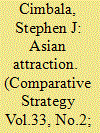

|
|
|
|
|
| Publication |
2014.
|
| Summary/Abstract |
The United States' military-strategic pivot toward Asia is motived by concerns about a rising China, about the increased significance of Asia on the world economic and political stages, and about the growing risks of nuclear proliferation and nuclear first use in that region. Nuclear Asia already numbers five acknowledged or de facto nuclear weapons states among its members: Russia, China, North Korea, India, and Pakistan. Failure to reverse North Korea's nuclear weapons status or political distrust among other powers may increase the number of Asian nuclear weapons states (including states with prospective nuclear-missile reach into Asia) to eight, creating an Asian-Middle Eastern nuclear arms race that defies containment. On the other hand, an alternative presents itself, in the form of a multilateral nuclear arms reduction agreement that would create three tiers of accepted nuclear weapons states and bar the door to new admits.
|
|
|
|
|
|
|
|
|
|
|
|
|
|
|
|
| 2 |
ID:
129104
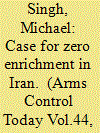

|
|
|
|
|
| Publication |
2014.
|
| Summary/Abstract |
In the debate over sanctions on Iran-their role in bringing Tehran to the negotiating table and their proper place in U.S. diplomatic strategy in the future-scant attention has been paid to a major shift in the negotiating position of the P5+1, the group of six countries (China, France, Germany, Russia, the United Kingdom, and the United States) that is negotiating with Tehran over the Iranian nuclear program. No longer is the P5+1 demanding that Iran halt uranium enrichment. Indeed, in the November 24 first-step nuclear accord, the Joint Plan of Action,[1] the P5+1 all but concedes that Iran will be permitted to enrich in perpetuity. In separate comments that have quickly become conventional wisdom among Iran analysts, U.S. negotiators now characterize their previous position that Iran should halt enrichment as "maximalist."[2] Although undoubtedly expedient, this shift away from a zero-enrichment negotiating position is misguided and unnecessary.[3] The U.S. shift away from zero enrichment to limited enrichment represents a significant diplomatic victory for Iran. For the last decade, the position of the EU-3 (France, Germany, and the UK) and then the P5+1 had been that Iran must "suspend all enrichment-related and reprocessing activities, including research and development." This position was enshrined as an Iranian obligation in a series of UN Security Council resolutions.[4] Iran, however, asserted a "right to enrich" and refused to halt enrichment after resuming it when nuclear talks with the European Union broke down in 2005. This difference formed the core of the confrontation that subsequently developed between Iran and the allies.
|
|
|
|
|
|
|
|
|
|
|
|
|
|
|
|
| 3 |
ID:
131601
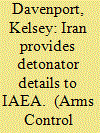

|
|
|
|
|
| Publication |
2014.
|
| Summary/Abstract |
Iran provided the International Atomic Energy Agency (IAEA) with information about the country's past development of a detonator that could be used as a trigger in nuclear weapons, the agency said last month in a quarterly report. The report also found that Iran is complying with the measures outlined in an interim agreement it reached Nov. 24 with six world powers that restricts its nuclear activities in exchange for sanctions relief. The "technical exchange" with the IAEA on the issues related to possible nuclear weapons development was the first since 2008, the May 23 report said.
|
|
|
|
|
|
|
|
|
|
|
|
|
|
|
|
| 4 |
ID:
150293
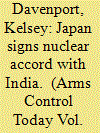

|
|
|
|
|
| Summary/Abstract |
India and Japan signed a nuclear cooperation agreement that will allow New Delhi to purchase material and technologies from Japan for its civilian nuclear program.
|
|
|
|
|
|
|
|
|
|
|
|
|
|
|
|
| 5 |
ID:
132001
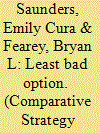

|
|
|
|
|
| Publication |
2014.
|
| Summary/Abstract |
This article examines the merits of extending the U.S. nuclear deterrent to the Middle East. It begins by looking at past practices of such an extension before delving into the overall issues presented by providing such a security guarantee. This article then looks at a brief survey of some of the regional issues facing a nuclear extension before considering the P-5 states and their concerns.
|
|
|
|
|
|
|
|
|
|
|
|
|
|
|
|
| 6 |
ID:
131591
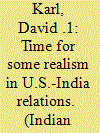

|
|
|
|
|
| Publication |
2013.
|
| Summary/Abstract |
Befitting two raucous democracies, once estranged but increasingly fraternal, the U.S.-India relationship routinely evokes grandiloquence about "natural allies," "an affair of the heart," "kindred spirits," "common DNA" and a defining partnership" shaping the destiny of the 21st century. Such sentiments were on full display in late 2009 when Prime Minister Manmohan Singh visited the White House as President Baraek Obama's first official state guest. In the run-up to the event, Obama declared that Mahatma Gandhi "was a real hero of mine" and let it be known that he considered Singh and India part of his family. The extravagant state dinner staged on the South Lawn was the hottest ticket in town, attracting party crashers to boot, and even the rainy weather did not dim an event the Washington Post likened to a Hollywood production. And with expectations raised by the recently-codified U.S.-India nuclear cooperation agreement, the two leaders spoke augustly about a "future that beckons all of us."'
|
|
|
|
|
|
|
|
|
|
|
|
|
|
|
|
|
|
|
|
|